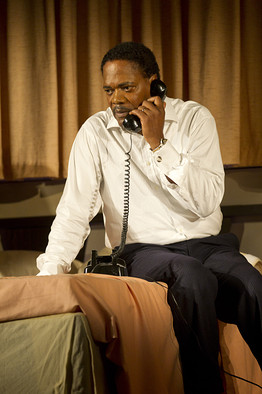In today’s Wall Street Journal drama column I review two New York premieres, The Mountaintop and We Live Here. Here’s an excerpt.
* * *
Most Americans regard Martin Luther King, Jr. as something of a saint, and don’t care to suppose that he might actually have been a great but flawed man. When it became known that Jackie Kennedy, of all people, called him “phony” and “tricky” in an interview recorded in 1964 but not released until last month, the result was a mass fit of cognitive dissonance, followed by…silence. Nobody likes to talk about his extramarital philandering, which was amply documented in FBI reports shared with Mrs. Kennedy by her gossipy husband, himself a serial adulterer. Yet Americans long ago faced the facts about John Kennedy and (mostly) continue to admire him. What makes Dr. King different? Why are we so reluctant to see him as he was?
 For the first few minutes of “The Mountaintop,” the new play about the last hours of Dr. King’s life that opened last night on Broadway, it appears as though Katori Hall is prepared to portray the civil-rights leader (played by Samuel L. Jackson) not as a wax dummy but as a creature of flesh, blood and smelly feet who smokes and drinks on the sly and views himself with the wry detachment of a man who knows better than to take his own reputation too seriously. The arrival on the scene of a sassy maid (Angela Bassett) bodes no less well, for it is clear that “Preacher King,” as she calls him, would very much like to coax her into bed. At that point “The Mountaintop” turns into a Tracy-Hepburn comedy rewritten for the chitlin circuit, but the laughs are honest ones and you don’t feel cheated–yet. Alas, Ms. Hall pulls an even bigger switch halfway through the play, about which critical etiquette precludes me from saying more than that she appears to have seen “Here Comes Mr. Jordan” more than once….
For the first few minutes of “The Mountaintop,” the new play about the last hours of Dr. King’s life that opened last night on Broadway, it appears as though Katori Hall is prepared to portray the civil-rights leader (played by Samuel L. Jackson) not as a wax dummy but as a creature of flesh, blood and smelly feet who smokes and drinks on the sly and views himself with the wry detachment of a man who knows better than to take his own reputation too seriously. The arrival on the scene of a sassy maid (Angela Bassett) bodes no less well, for it is clear that “Preacher King,” as she calls him, would very much like to coax her into bed. At that point “The Mountaintop” turns into a Tracy-Hepburn comedy rewritten for the chitlin circuit, but the laughs are honest ones and you don’t feel cheated–yet. Alas, Ms. Hall pulls an even bigger switch halfway through the play, about which critical etiquette precludes me from saying more than that she appears to have seen “Here Comes Mr. Jordan” more than once….
Anyone who doubts that life is unfair need only buy a ticket to Zoe Kazan’s “We Live Here” in order to have his nose rubbed in the inescapable truth of human inequality. Ms. Kazan, lately of “Angels in America” and “A Behanding in Spokane” and the most gifted stage actress of her generation, also writes plays on the side. This one, her first to be produced in New York, is an impressively self-assured domestic drama about Dinah and Althea (Betty Gilpin and Jessica Collins), two sisters who have a man (Oscar Isaac) in common. It complicates matters further that the 19-year-old Dinah is much younger than the man in question, or that Althea is a flaming neurotic who is about to marry a different man (Jeremy Shamos), a very nice guy who clearly didn’t know what he was getting into when he popped the question.
Ms. Kazan, who is 28, has given us the kind of solidly constructed play that today’s young authors tend not to favor, and her wide-ranging stage experience has taught her how to make the pieces fit together tightly. It’s salted with comic repartee that is quick but not glib, and she also knows how to write scenes that imply more than they say….
* * *
Read the whole thing here.
Archives for October 14, 2011
TT: Don’t call it art
In today’s Wall Street Journal I empty both barrels into the PBS Arts Fall Festival, which kicks off tonight. Here’s an excerpt.
* * *
Paula Kerger, the president and CEO of PBS, gave a speech a year and a half ago in which she more or less admitted what everybody already knew, which is that public-TV arts programming–what there is of it–is barely worth watching. “To be candid, over the last year, we haven’t done as good a job as we could,” she said. “I think we can do more….We plan to significantly expand the presence of the arts in our prime-time lineup.”
Now comes the payoff. This week the network launches its new arts initiative with a “festival” of nine arts-related programs that are scheduled to run on Friday nights through mid-December on those PBS affiliates that care to carry them. And what does Ms. Kerger have in store for her art-starved viewers?
In chronological order, here’s the lineup:
• The Guthrie Theater’s new production of “H.M.S. Pinafore,” in which the classic Gilbert and Sullivan operetta, according to the press release, is “infused with fresh musical arrangements ranging from big-band swing to classic pop.”
 • A Cameron Crowe-directed “American Masters” documentary about Pearl Jam, the Seattle rock band.
• A Cameron Crowe-directed “American Masters” documentary about Pearl Jam, the Seattle rock band.
• A “Great Performances” telecast in which George Balanchine’s “Square Dance” and “Western Symphony” and Twyla Tharp’s “The Golden Section” are danced by Edward Villella’s Miami City Ballet.
• “Give Me the Banjo,” a Steve Martin-narrated documentary about the role of the banjo in American music.
• Another “American Masters” episode, this one about the making of “Fondly Do We Hope…Fervently Do We Pray,” a “dance-theater piece” about Abraham Lincoln that was created in 2009 by Bill T. Jones, the black modern-dance choreographer.
• “Women Who Rock,” a “performance documentary” made in collaboration with Cleveland’s Rock and Roll Hall of Fame and Museum.
• Los Angeles Opera’s 2010 production of Daniel Catán’s Spanish-language stage version of the popular Italian film “Il Postino,” starring Plácido Domingo.
• An outdoor concert given last month in Central Park by Andrea Bocelli, the Italian crossover tenor, and the New York Philharmonic, featuring a guest appearance by pop diva Celine Dion.
• The San Francisco Ballet’s dance version of “The Little Mermaid.”
I have just one question: Who’s kidding whom?
These shows don’t add up to an arts festival, or anything remotely like it. What PBS is giving us instead is a stiff dose of the usual safety-first pledge-week fare, only spread out over two months. Except for Miami City Ballet’s Balanchine-Tharp bill, all nine programs are carefully designed to please those members of the gray-ponytail set who prefer politically correct popular culture to high art. Straight plays? Who needs ’em? Jazz? Bor-ing. As for the visual arts, they don’t even exist in the unserious, unchallenging world of the PBS Arts Fall Festival. Instead we get recycled Puccini, goosed-up Gilbert and Sullivan and yesterday’s grunge rock….
* * *
Read the whole thing here.
TT: Almanac
“The one great principle of the English law is, to make business for itself.”
Charles Dickens, Bleak House
